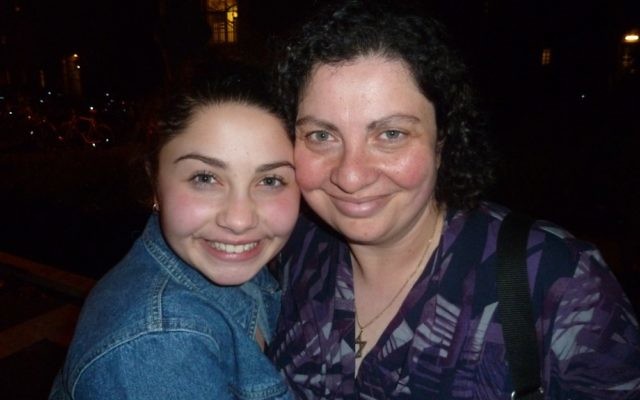My Jewish Feminist Roots and My Mother’s Foundation

In third grade I was the new girl at my Reform Jewish day school. I was short and chubby and had bright, rosy cheeks. During my first prayer service I sat quietly and listened to the contemporary and exotic Reform melodies.
I had gone to a Conservative school while learning most of the prayers, so when I heard a familiar tune, I joined in enthusiastically. Quickly, I realized I was making a fool of myself by singing the wrong words. I was singing “modah ani lefanaich” while everyone else sang “modeh ani lefanecha.”
Modeh Ani is a prayer traditionally said while waking up to thank G-d for returning our souls to our bodies. My mother, a Reform rabbi, had always woken me up singing these words, but she had changed the male-oriented, traditional words (lefanecha) to the feminine (lefanaich), so that the praise came from a female and was received by a female G-d.
At the time I was unaware of my thoughtful upbringing and confused as to why my version of Modeh Ani could not be found in the prayer book.
My mother went to an Orthodox day school where Judaism and feminism did not coexist; in fact, feminism didn’t really exist at all. She was constantly pushing boundaries; as a fourth-grader she questioned why two of Jacob’s wives weren’t considered among the Jewish matriarchs.
She continued to ask questions and challenge the status quo, and 25 years later, already a mother of two, she was ordained a rabbi. She wanted to give me all the opportunities that she had fought so hard for; from the get-go, she raised me as a Jewish feminist.
For my bat mitzvah I was given my own set of beautiful tefillin (traditionally worn only by Jewish men). I also bought the perfect, sparkly white dress and got my hair done exactly like the magazine cutout I brought to the salon.
My thick, curly hair was put through hours of manipulation. First it was cut, then blow-dried, then straightened, then curled again.
The morning of my bat mitzvah, I was unwilling to put on the half of the tefillin meant to go on my head. They would not only negate the hours of work put into my locks, but also ruin my bat mitzvah photos and therefore my life.
There was no arguing with my 13-year-old logic, especially not 10 minutes before the service.
I led services with only half the tefillin set on, satisfying my femininity while expressing my religious commitment. By the way, the photos are great.
Now I’m a slightly more open-minded version of myself, but I still apply tefillin rosh (the part that goes on my head) begrudgingly, not wanting to mess up my hair. There are parts of my mother’s Jewish feminist identity I have adopted and made mine, applying them with praise and love. There are also parts that I have thoughtfully and generally politely rejected.
My mother struggled her whole life to bring her love of Judaism and her expectation of gender equality together. I was raised on the foundation she worked tirelessly to build. In my first week of third grade and 10 minutes before my bat mitzvah, I was not particularly thankful for this foundation, but it’s something I’ve grown to appreciate and love.
I grew up with a Jewish feminist path not only as an option, but as the only thing I knew. When I was sitting in that service in third grade, embarrassed that I was singing the “wrong” words, I had no idea it was because my mother was raising me as a Jewish feminist.
When I pushed back against my mother, insisting that tefillin had to work with my sense of beauty, I did not know I was creating my own Jewish feminist identity.
Now I know that this is such a blessing in my life. I was given a deep spiritual connection that wasn’t compromised by oppression, and I have embraced this identity. My mother struggled so that I could have this identity, and now I want to work to sustain it for future generations.
Aliza Abusch-Magder is a sophomore at the Weber School. This column first appeared on the website of the Jewish Women’s Archive, where she is writing a monthly post as a Rising Voices Fellow.



comments